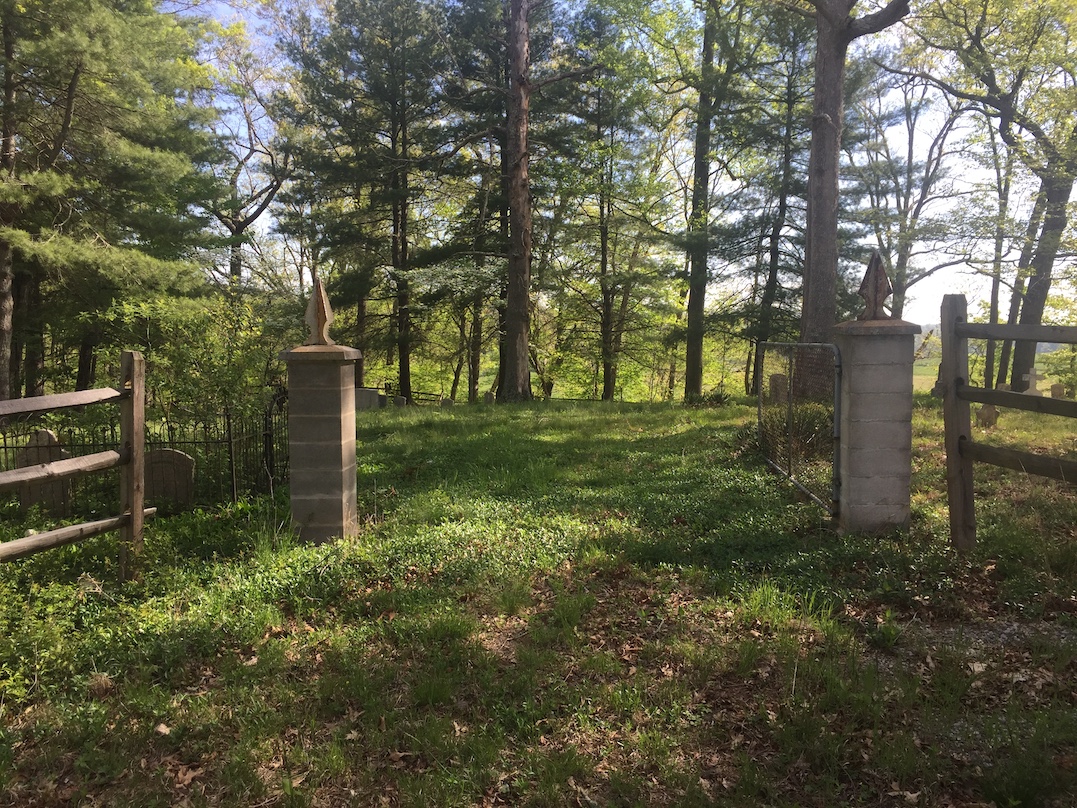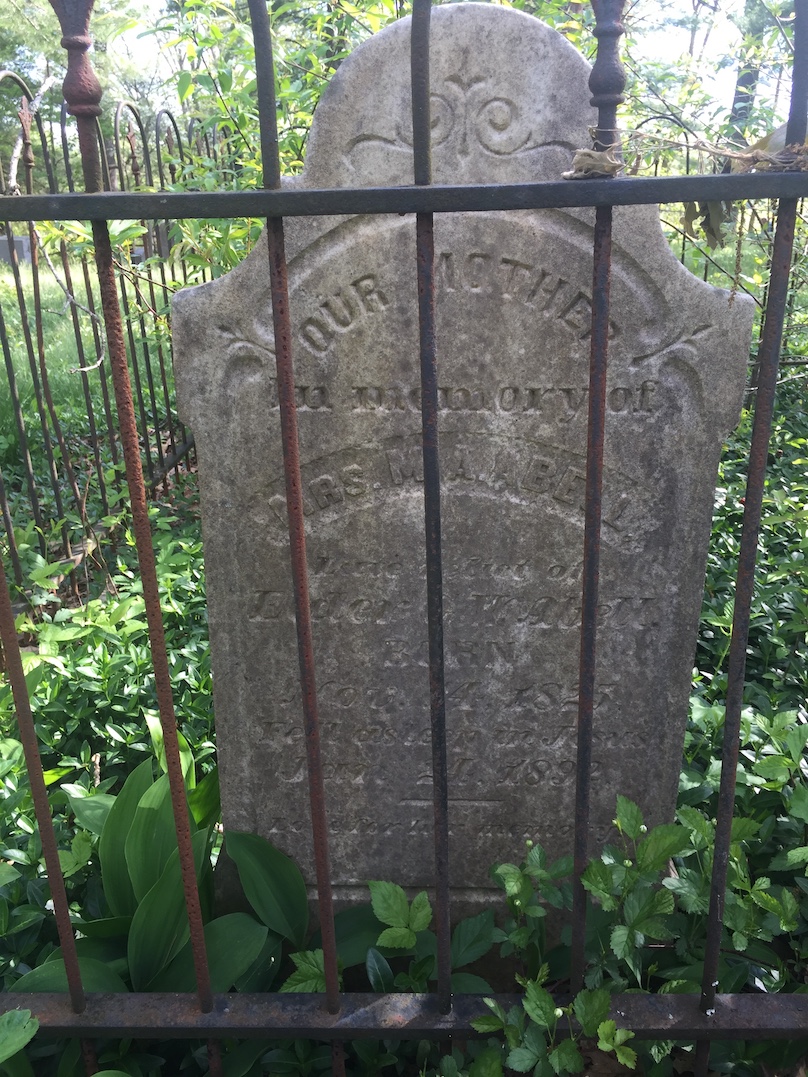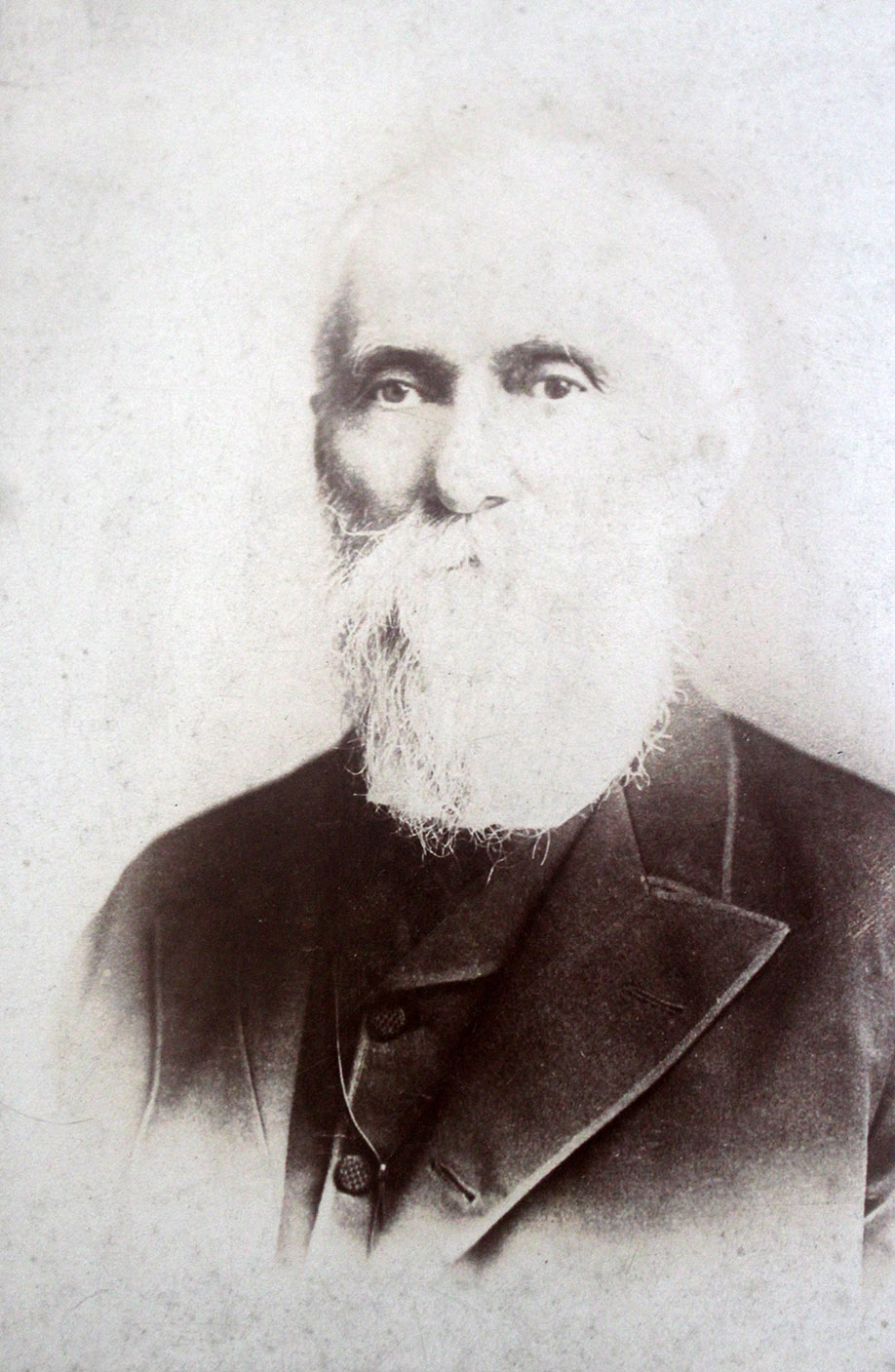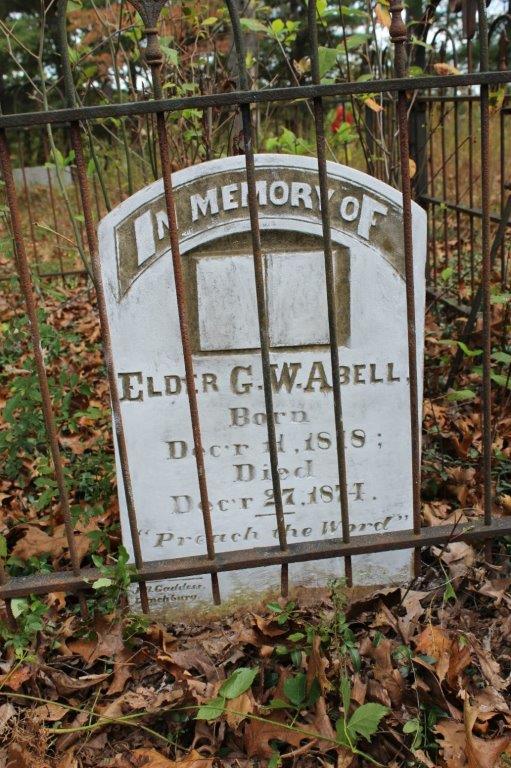George Washington Abell
1818-1874
![]()
George Washington Abell
The subject of this sketch was not one of the early pioneers, but it was his lot to ably second the work they had begun. He was born on the 11th of December, 1818, in Albemarle county, two miles west of the University of Virginia, where his father and mother resided for fifty years. His father, John S. Abell, was a Baptist minister, and his mother a member of that denomination, and both, by precept and example, early impressed him with religious reverence. He was taught to read and reverence the Holy Scriptures, and to offer up regularly his evening prayer. It was not then the custom, as now, to advance children in the knowledge of the Word, the plan of Salvation, or the obedience of Faith; consequently, very little, if anything, in that direction was taught him. This arose, not from any lack of interest in his religious welfare, but from their lack of knowledge in the plan of Salvation, and the false ideas then prevalent concerning election, irresistible grace, and a divine influence in conversion.
George began to attend school when about seven years old, and had to walk two miles, both morning and evening. He attended country schools only five or six years, when he left school to become clerk in a store at Charlottesville; a position which was soon exchanged for that of an assistant in the post-office of that town. But he soon left this and entered a classical school, taught by a Mr. Powers. Here he advanced rapidly in his studies, and soon his whole character underwent a change. He was respected by all who knew him for his high moral character, and also for his veneration for his pious father and his love for his Christlike mother. When about sixteen years of age he became deeply concerned about his salvation, and was not long in reaching a determination in the matter. He approached his elder brother on the subject, informing him of his faith in Christ and his determination to be baptized. This gave much joy to his parents and brother. He was baptized forthwith by his father, near Charlottesville, and united with the Baptist Church of that town. He resolved to sacrifice all for Christ by preparing himself for the Christian ministry. He commenced at once to exhort and pray in prayer-meetings. He was regarded as a prodigy of learning, and was encouraged by every laudable means to carry out his determination to preach the Gospel.
His progress in the classical school of Mr. Powers made him well prepared to enter the University of Virginia, which he did when he was about twenty years old. Here he showed the same marked determination that had characterized his previous course. He was a hard student, and carried it to such an extent that his health became impaired. He seemed for a time to sacrifice everything for his studies; even his religious duties were neglected, and he partly, if not entirely, abandoned his high purpose of consecrating himself to the Gospel ministry. For a time he thought of entering the political arena, and after gaining a position of influence he would turn all to the advancement of the cause of Christ. For this end he studied day and night, even trespassing upon the Lord's Day, denying himself relief or rest until his health was crushed and his mind trembled beneath the pressure. But there is a superior and superintending Power, with sleepless eyes, ever watching the affairs of his children. They may propose, but he disposes,
"And works his gracious will."
He mercifully laid the hand of affliction upon this young man, and for many long months his friends despaired of his life. But the same Power that had brought him so low raised him up, chastened, refined, purified, and with all the devotion and zeal of his conversion to God.
After his recovery Bro. Abell began to study the Scriptures with renewed earnestness, and on one occasion, in conversation with Bro. Samuel Teel, an old schoolmate and a disciple of Christ, their talk turned upon the remission of sins and its kindred subjects. They then and there entered into an agreement that they both should study these subjects as if they had never studied them before, and the one who was convinced he was wrong should own it and act accordingly. They had frequent interviews after this compact, and talked freely together upon the differences between them, and in course of time
Bro. Abell began to feel that he was standing upon rather a shaky foundation. Brother Abell was regarded at this time as rather a bright star in the Baptist ecclesiastical heavens. He was learned above most young men, zealous and devoted, had a strong will, bent upon success, and of such independence of spirit that he read every book worthy of being read; and would go and hear any one preach who could impart to him any information.
One Lord's Day evening, in 1840 or '41, he was in Charlottesville, and desired to hear a discourse before returning home. It being inclement weather, no other church was open but the disciples', and he concluded to go and hear Bro. R. L. Coleman. There was nothing in the congregation to inspire the preacher to an extra effort until this young man entered and took a seat in the rear. Immediately Brother Coleman was inspired with the hope of doing this young Baptist preacher some good. As soon as he arose to speak all saw that he was about to give them something rich in thought and comforting to the heart. It has been said that he delivered one of the finest sermons of his life upon that occasion. His sermon was based on Rom. 10: 6-11, the arrangement was well made, and the arguments powerful and unanswerable. He closed with a very instructive appeal in favor of the old Gospel. Bro. Abell went there to hear with candor, and his attention was secured from the first to the last; and so absorbed was his mind with what he had heard, that in walking home he took no notice of the path he trod.
The next day he sought an interview with Bro. Coleman, in which he informed him of the effect of his discourse; how it absorbed his thoughts and enlightened his mind, especially upon that part of the Christian system concerning the plan of salvation, and closed the interview by saying, "I cannot remain with the Baptists, with my present views, and shall, with the help of the Lord, be at the Christian Church next Lord's Day and unite with you on the Bible alone."
His determination was carried out on the following Lord's Day, much to the astonishment of his parents and his Baptist brethren. This strange act on the part of George W. Abell must be explained, so as not be creditable to the disciples. So it was soon circulated far and near that George W. Abell was deranged. And to such votaries of sectarianism there could be no other explanation. Former bosom companions treated him with coldness, but he was at all times the same sweet-tempered and quiet-minded Christian young man, and bore meekly their taunts and ridicule. To cap the climax of religious prejudice and bigotry, the Baptist Church of Charlottesville acted against him as they would have acted against a drunkard or a debauchee, and upon their Church record is found these words: "George W. Abell; excluded February 26, 1842." And for what was he excluded? There it stands recorded,—a pure, holy, and godly man!—one that believed in Christ with all his heart, had repented of his sins and been baptized in the name of Jesus by his father, John S. Abell, and from the day of his baptism to the day of his death was an ornament to the religion of the Lord, Jesus Christ.
Brother Abell now continued his studies at the University, taking a very extensive course of study, and finally graduating in every school except in the school of Chemistry. Brother Abell was now free from the University; but he was in appearance nearly a physical wreck. He desired to preach, but he had doubts as to whether he could become a preacher or not. On this point he consulted his friend James W. Goss, who in turn told Bro. Abell some of his own early difficulties in that line; and seeing that their experiences were similar, he gathered courage and determined to die in the harness.
He began preaching around Charlottesville, and soon took a trip through Tidewater district in company with Bro. Goss. From this time his former Baptist brethren ceased in a large measure their persecution. They were now satisfied that his convictions were deeply founded, and that they could not move him by their sarcasm, ridicule, or pseudo-arguments. He became more cheerful at this relief and began to use to the best effect his superior educational advantages.
On May 30, 1845 Bro. Abell was married to Miss Mary Ann Nalley, of Nelson County. He had baptized her the previous year, and at the time of their marriage he was twenty-seven and she nineteen years old. During the next five years he taught school and preached as he had opportunity; but other duties hung heavy on his hands, for he desired to give his whole time to the proclamation of God's Word. Through the influence of Brethren Coleman and Goss, at the annual meeting of the Disciples, held in Richmond in the fall of 1849, Bro. Abell was appointed State Evangelist, and entered upon his duties in February, 1850.
He now commenced the labor that gave him a name long to be remembered among Virginia disciples, and from that day to the day of his death he was wholly devoted to his high and holy calling. In the small space at our disposal it would be impossible to give anything like a connected account of his labors. This has already been done in a separate volume by Bro. Peter Ainslie, to whom we are much indebted for the material found in this sketch.
On the 11th of November, 1867, Bro. Abell was riding horseback before daybreak to join his family, with whom he was to move to Tazewell county, when his horse fell with him. Bro. Abell 's right leg was broken between the knee and the ankle. As the horse rose, he rose on him, and rode five miles to Dr. Anderson's, who set it, and putting him in his own carriage, sent him home. He got home about dark, and rested tolerably well that night. The next clay he insisted on starting, as they had their goods already packed. His wife and family tried to dissuade him from going, but he thought he could undergo the trip. They were on the road in all about three weeks. They rested at Snowville, Pulaski county. On Lord's Day after their arrival Bro. Abell had himself propped up between a table and a chair, and in that situation he preached to the people. He always looked upon the body as only the house —the tent—in which the "I"—the real self—was to sojourn, and he could endure heat,' cold, pain, labor, all things, so that it but helped him in his chosen work. An acquaintance of his once charged him rather warmly with spending too much time away from his family; to which he promptly gave the characteristic reply: "The Devil told me so before, but I did not believe him."
In 1869 Bro. Abell held a debate with Mr. Gilbert, of the M. E. Church, South, at Newport, Giles county, Virginia. Three days were spent on the Action of Baptism, and then they adjourned to meet a week or two later and discuss Infant Baptism. In the intermission between the debates Bro. Abell preached at Pembroke, only a few miles distant, and baptized one hundred persons; a goodly number of whom were Methodists. Major Samuel Lybrook, the president moderator of the debate, was among the number who obeyed the Lord, and this brother is still an active elder of the Pembroke congregation. No further comment upon the result of the debate is needed than the above stated results. Mr. Gilbert, who was a shrewd debater of twenty-five years' experience, became irritable the last day of the debate, perhaps owing to the fact that on that morning Bro. Abell had baptized three more of his Methodist brethren.
The last year of his life Bro. Abell moved to Tennessee. In his farewell address to the Virginia disciples he wrote:
"The prime of my life has been spent among you; for nearly one quarter of a century I have been your servant. I have grown gray in that service: the manner in which I performed it, God, men, and angels are witnesses of. I need not appeal to you in regard to it. I have not shunned to declare to you the whole counsel of God; I have kept back nothing that was profitable to you; I have coveted no man's gold, no man's silver, no man's apparel, no man's wisdom, might, eloquence, influence, power, honor. I have sought humbly, unpretendingly, zealously, to do the will of God, to glorify His name in the conversion of sinners and the edification of saints. To accomplish this, I have exposed myself to winter's storm and summer's heat; traveled through rain, hail, and snow, by day and by night. I have been a stranger at home; so much so, that for a season it will seem strange to my wife and children for me to remain with them. But—and it makes my heart sad when I pen it, and the tears in my eyes obscure my writing—I know, in regard to many of you among whom I have gone preaching the Kingdom of God, / shall see your faces no more. "Farewell! my dear brethren and sisters, farewell. Farewell! to the rich; farewell! to the poor; farewell! to the learned; farewell! to the ignorant; farewell! to the white; farewell! to the colored; farewell! Christians; farewell! sinners; to one and all, a long, a last, Farewell! ! ! God bless you all for time and eternity. In the morning of the first resurrection, may we all arise in clouds, to meet the Lord in the air, and thus be 'forever with the Lord. '
"G. W. Abell."
Source: Frederick Arthur Lodge, The Plea And The Pioneers In Virginia, Richmond: Everett Waddey Company, c.1905, pages 163-171
![]()
The Abingdon Virginian, January 15, 1875, Friday, p.3
![]()
Death of Bro. G. W. Abell
The year 1874 has witnessed the departure, from the shores or time, of many of the good and the great. "One by one" our best and ablest men have laid down their lives, and have gone across the mystic river. Death has claimed them—the Lord has called them, and they have responded to the summons. Who shall fill the places of such soldiers of the cross, as Fanning, Barclay and Abell, who have fallen, as it were, just at our sides? Who shall speak for T. Fanning, the giant intellect, and strong defender of "The Faith"—the strict constructionist of the ''Law of the Spirit?" Who for J. T. Barclay, the traveled, and erudite missionary to Jerusalem, and author of "The City of the Great King;" and last, but not least, who will do the labor of the self-sacrificing, hard-working evangelist, George W. Abell, who spent his manhood’s power, in preaching the truth, as it is in Christ Jesus, all over the State of Virginia; and who coming to Tennessee, after one year’s hard, though, to him, delightful service, in the earthly labors, and lies cold in death? Who shall fill their places?
George W. Abell was born in Albemarle County, Va., Dec. 11th, 1818. Died in Rutherford County, Tennessee, Lord’s day Dec. 27th, 1874. Consequently he was at the time of his death 56 years and 16 days old.
At about the age of 17, he joined the Baptist church, in the communion of which he remained several years. But after a more thorough examination of the subject, in the light of God’s Truth, he became convinced that the Bible and the Bible alone, (as we have often heard him express it) must be the rule and faith of Christians; and where it speaks, the Christian may speak, and where it is silent, the man of God dare not speak. He therefore joined his fortunes with that hatred sect (?) who delight to honor their Lord and Master by taking the name “Christian.”
In the year 1841, he took the degree of A. M., at the University of Virginia, and soon thereafter, commenced to preach the unsearchable riches of Christ. For more than thirty years his business has been the Gospel.
I have never known a man more single-minded than he, and one who was more fully devoted to the cause of ChrisL In the year 1845 he was married. From this union there are two sons and four daughters, who survive the good father. Four of these children, three daughters and one son, are in a great measure to be raised and educated.
Bro. Abell had but recently made a tour to North Alabama, where he visited Bro. Barclay’s family. He returned home about the middle of the week, and Friday night succeeding his return (it being the 18th day of December) he was very violently attacked with Pneumonia. Then days thereafter, on Sunday the 27th, he breathed his last, at 11:30 A. M. He sank quietly to rest, without a murmur or a struggle. During all his sickness, he was never heard to complain at the ways of Providence, but on the other hand, expressed a firm conviction that the ways of the Lord were “true and righteous altogether.” He made no provision for the flesh, nor did he speak concerning temporal affairs. He prayed much, and seemed wholly intent upon the discharge of his spiritual obligations.
In the moments of feverish frenzy, no word escaped his lips, expect that it were an exhortation to Godliness, a prayer for divine blessing, or a benediction upon a waiting congregation. Not long before his death, the poor palsied tongue did audibly and distinctly give expression to the ruling passion of the soul; and a more beautiful prayer and benediction is seldom heard, in these low grounds of sorrow. He passed away, just at the hour when, two weeks before, he thought he would be engaged in delivering his farewell sermon to the church here, (Murfreesboro), prior to his taking up his residence at Trenton, Ky. His body now rests beneath the soil of the “Old Dominion” among the people for whom he labored so long. And in whose hearts and afflictions will his memory be perpetually enshrined.
We our his loss. And sympathize with the afflicted and bereaved widow and orphaned children. But we are assured that, with our confidence placed in the goodness, mercy, and love of God, we shall find that:
“There is an hour of peaceful rest
To mourning wand’rers given:
There is a tear for souls distress’d,
A balm for every wounded breast—
’Tis found above—in heaven.
There is a home for weary souls,
By sins and sorrows driven;
When tossed on life’s tempestuous shoals,
When storms arises and ocean rolls,
And all is drear—but heaven.
There faith lifts up the tearless eye,
The heart with anguish riven;
It views the tempest passing by,
Sees evening shadows quickly fly
And all secure—in heaven.”
-Jas. E. Scobey
Murfreesboro, Tenn., Jan. 6, 1875.
-Gospel Advocate, January 14, 1875, pgs. 59-60
![]()
Directions To Grave
Snowville, Virginia is a small community on the very eastern edge of Pulaski County, separated from Montgomery County by the Little River. Snowville is on State Highway Route 693, Lead Mine Road. On the WEST edge of the village, and on the NORTH side of Route 693 is a lovely farm, and an equally beautiful, large, old, white, multi-section farm house. The LANE into this farm begins on Route 693 with a dual-pillar, concrete-cased, entrance gateway. Immediately ACROSS Route 693 from this gateway entrance, on the south-side of Lead Mine Road is a cattle gate, with vehicle path up a hill leading toward an open meadow. The path is without gravel, only bare dirt, with lush grass in the center. Follow this grass lane, along the left-edge of open meadow. (Grass may be high in summer, but take your time and look for the ruts. Drive around the outside of the field to the left rear of the field. The old cemetery is on the left, just into the woods. A large pillared entrance (back in the woods) into the cemetery is easily visible, and a small grass parking space is in front of the cemetery. These directions DO NOT include permission to trespass across the meadows. All visitors enter at their own risk. And certainly, any planned service to the cemetery must surely seek permission of the land-owner of the access lane.
Once entering the cemetery there are two or three graves of note. One is that of Elder G.W. Abell, located near the entrance just on the left, and surrounded by an iron fence. To the right of the cemetery is the obelisk of Snowville's founder A. Snow., and Dr. Chester Bullard's monument is at the rear of the cemetery along the wood fence.
GPS Location
37°01'45.7"N 80°33'28.8"W
37.029351, -80.558012
![]()

Abell plot jut to left of entrance

Our Mother
In Memory of
Mrs. Mary Ann Nalley Abell
Late Relict of
Elder G.W. Abell
Fell Asleep In Jesus
Born
November 14, 1825
Died
January 24, 1892
Love for her memory

In Memory Of
Elder G.W. Abell
Born - December 11, 1818
Died - December 27, 1874
![]()
Photos Taken 04.2019
Webpage produced
12.24.2019
Courtesy Of Scott Harp
www.TheRestorationMovement.com
In April, 2019, I had the privilege to speak on the lectureship program of Southeast Institute of Biblical Studies, held at the Karns church of Christ in Knoxville, Tennessee. Along with me was long time friend and fellow laborer in restoration research, C. Wayne Kilpatrick. After we both completed our responsiblies at SEIBS, we made our way into southern Virginia where we sought the burial places of several leaders in the Restoration Movement in that area. Special thanks are extended to John Showalter, great-grandson of J.T. and Sarah Showalter, who traveled with us from his home in Abingdon, Va., to show us these graves as well as other sites in his Snowville, Va. home.
![]()


